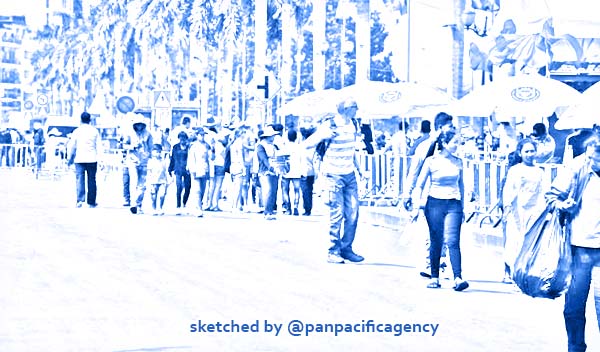Phnom Penh governor highlights capital’s rise from ‘ghost town’ to ‘pearl city’

Tourists walk along the street during the Water Festival in Phnom Penh today. KT/ Khem Sovannara. Sketched by the Pan Pacific Agency.
PHNOM PENH, Dec 4, 2019, The Khmer Times. Phnom Penh governor Khuong Sreng yesterday highlighted the capital’s transformation from a “ghost town” to a “pearl city” following decades of civil war in the Kingdom, The Khmer Times reported.
He pointed out the capital’s achievements during the conference of the International Association of Francophone Mayors attended by more than 400 delegates from 140 cities in 41 countries.
The 39th conference of AIMF is being held until today in conjunction with the 40th anniversary of the founding of the association. The theme of the conference is “Resilient Cities: Addressing Challenges and Reconstruction of Cities”.
According to an AIMF statement, the conference will focus specifically on large-scale reconstruction issues in the aftermath of conflict or disaster.
Mr Sreng noted that Phnom Penh was transformed from almost an empty shell after the collapse of the Khmer Rouge in 1979 to become a “pearl city”.
“Our city was destroyed during the decades of civil war. There was a road without people, and there were houses without people living in them,” he said. “At that time there was also only rubble, which made Phnom Penh look like a ghost town.”
Mr Sreng said that under the leadership of Prime Minister Hun Sen’s government the capital grew rapidly.
“Phnom Penh is the heart of the Kingdom of Cambodia,” he said. “Our city is known as the pearl city of Asia.”
“In the last four decades after the civil war ended, our capital has been developed,” Mr Sreng noted.
CPP lawmaker Mok Mareth, who is attending the conference, yesterday said he agreed with Mr Sreng, noting that after the Khmer Rouge regime collapsed in 1979, only 60 people were living in the capital.
“In the wake of the liberation day January 7, 1979, the day of the survival of the Cambodian people, Phnom Penh city resembled a ghost town.” Mr Mareth said. “Piles of rubbish and dead bodies were present everywhere. The utilities were not operating, the sewage was clogged.”
Pa Socheatevong, chief of Municipal Council, said during the conference that its theme aptly described the condition of Phnom Penh which saw no development during the civil war.
He said Phnom Penh has now transformed into a city thriving with development activities, is prosperous and populated by nearly three million people enjoying a decent lifestyle.
Mr Socheatevong said that in 2013, the Kingdom stepped up its efforts to maximise its potentials and resources as it sought to transform itself to become a lower-middle-income economy by 2015 as planned by ensuring an average annual growth rate of seven to eight percent.
“In 2015, Cambodia realised the plan by becoming a lower-middle-income country, enjoying an average seven percent annual growth rate, with Phnom Penh City playing an important role as a locomotive driving the economic growth,” he noted.
“Consistent with the global trend of rural-to-city migration, the economic growth enjoyed by the city prompted many people to migrate out of their homes in the rural areas to establish themselves in Phnom Penh by all means at their disposal,” he added.
“There were also greater demands for the exercise of rights and freedoms in the framework of multi-party democracy,” he said, noting that the riots caused by former opposition CNRP in 2013 and 2014 were also big challenges.
“The difficulty facing the municipality during that period was when the exercise of rights and freedoms through demonstrations turned into riots fanned by certain politicians from behind.” Mr Socheatevong said.
He said public order issues, solid and liquid waste disposal and lack of infrastructures also needed to be enhanced in terms of scope.
Mr Hun Sen yesterday met with several foreign delegates of the conference who paid courtesy calls on him.
During a meeting with Christian Roger Okemba, Mayor of Brazzaville of the Republic of Congo and Vice President of the AIMF at the Peace Palace yesterday, Mr Hun Sen noted that Phnom Penh is facing four major challenges, his assistant Eang Sophalleth told reporters after the meeting.
“The current development has exposed four main challenges which are traffic congestion and accidents, lack of parking space, waste management, and wastewater treatment,” he quoted the Prime Minister as saying.